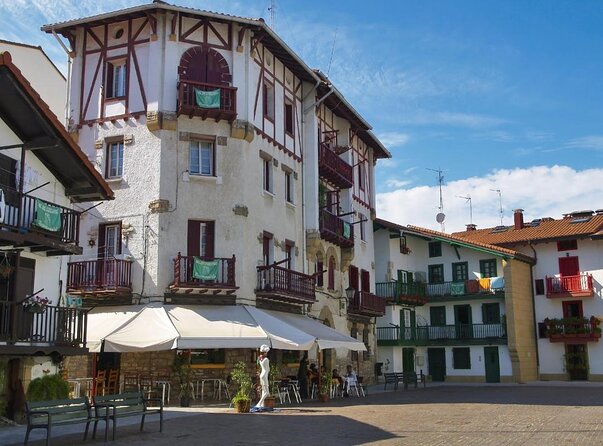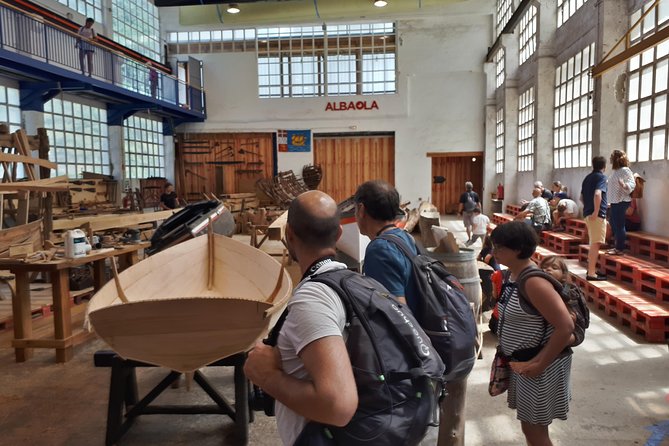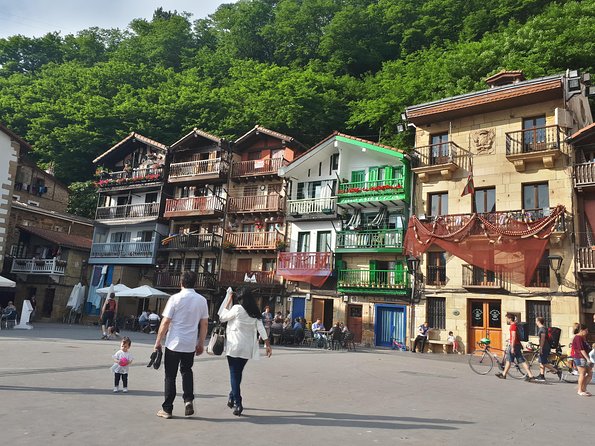The Basque Country’s deep and lasting connection to the sea is woven into the fabric of its storied maritime past. From the historic fishing and whaling practices that sustained coastal communities for generations to the unique boat-building techniques passed down through the ages, this captivating tour offers an immersive glimpse into the region’s seafaring traditions. Exploring picturesque villages and learning about the importance of preserving these legacies, visitors gain a newfound appreciation for the Basque people’s unwavering relationship with the ocean. But to fully understand the significance of this maritime heritage, one must delve deeper into the captivating history that has shaped the Basque way of life.
Quick Points

- The Basque region has a rich maritime heritage, with a deep connection to the sea reflected in its shipbuilding traditions and fishing practices.
- Basque seafaring history is marked by the significance of whaling and fishing, as well as the development of unique boat-building techniques and navigational methods.
- The dramatic northern Basque coastline, with its towering cliffs and picturesque fishing villages, showcases the region’s seafaring legacy and the resilience of its people.
- Basque maritime heritage has been intricately woven into the local economy, culture, and identity, with seafaring festivals, cuisine, and architectural styles reflecting this connection.
- Preserving Basque maritime legacies has become a priority, with museums, heritage tours, and public-private partnerships working to safeguard traditional skills and historical sites.
Exploring Basque Maritime Heritage

One of the highlights of the Basque Maritime Past experience is the opportunity to explore the rich maritime heritage of the Basque region.
Travelers will visit the museum, where they’ll discover the Basque people’s deep connection to the sea. They’ll learn about the region’s shipbuilding traditions, fishing practices, and the pivotal role maritime activities have played in shaping the Basque culture.
The boat crossing to a nearby island provides a chance to take in the coastal landscape and witness firsthand the Basque seafaring legacy.
This experience offers a unique window into the Basque people’s enduring relationship with the maritime world.
You can also read our reviews of more tours and experiences in France.
Discovering Basque Seafaring Traditions
The Basque Maritime Past experience delves deep into the region’s storied seafaring traditions, allowing visitors to gain an intimate understanding of the Basque people’s enduring connection to the sea.
The tour highlights:
-
The rich history of Basque whaling and fishing, which have shaped the culture and economy for centuries.
-
The unique boat-building techniques and design elements that have evolved over generations to suit the region’s rugged coastline.
-
The role of women in Basque maritime communities, who often played vital roles in supporting their families’ livelihoods.
-
The ongoing preservation of traditional maritime skills and the passing of this knowledge to future generations.
The Basque Coastal Landscape

Nestled along the rugged northern coast of Spain, the Basque Country boasts a dramatic and picturesque landscape that has long captivated visitors.
Towering cliffs, hidden coves, and windswept beaches offer a glimpse into the region’s maritime heritage. Charming fishing villages dot the coastline, their whitewashed buildings and red-tiled roofs reflecting the region’s rich seafaring traditions.
Visitors can explore the rocky headlands, hike along coastal trails, and witness the powerful tides that have shaped this unique and breathtaking environment.
The Basque coastal landscape is a testament to the resilience and adaptability of the Basque people, who’ve long called this rugged terrain home.
Basque Fishing and Whaling History
For centuries, the Basque people have been deeply intertwined with the sea, harnessing its bounty through their mastery of fishing and whaling.
Historically, Basque fishermen have excelled at:
- Cod fishing in the North Atlantic waters.
- Hunting whales in the Bay of Biscay.
- Developing advanced boat-building techniques.
- Pioneering navigational methods to expand their maritime reach.
This rich maritime heritage is celebrated in the Basque region, where visitors can enjoy the stories of these seafaring traditions through museums, boat tours, and cultural experiences.
Basque Maritime Transportation and Trade
Integral to the Basque maritime past was their mastery of maritime transportation and trade.
The Basque leveraged their strategic location along the Bay of Biscay to establish thriving maritime commerce, connecting the region to trading partners across Europe. Basque ships carried local goods like iron, timber, and salt to distant ports, and returned home with spices, textiles, and other products.
This maritime trade fueled the Basque economy and enabled cultural exchange. Adept at shipbuilding and navigation, the Basque people were well-equipped to capitalize on their coastal geography and become key players in historical maritime activity across the Atlantic and beyond.
- From Paris: Reims and Champagne Tasting Full-Day Tour
- From Nice: Saint-Tropez and Port Grimaud Day Tour
- Paris: Musée D’orsay Guided Tour With Pre-Reserved Tickets
- From Nice: Verdon Gorge Full-Day Tour
- From Le Havre: D-Day Beaches Shore Trip With Packed Lunch
- From Nice: Provence and Its Medieval Villages Full-Day Tour
Basque Coastal Communities and Culture
The Basque coastal communities along the Bay of Biscay have long been shaped by their intimate relationship with the sea.
These vibrant towns and villages have developed unique cultural traditions, including:
-
Seafaring festivals and celebrations that honor the importance of fishing and maritime trade.
-
Renowned cuisine that heavily features fresh seafood, reflecting the local bounty of the waters.
-
Distinctive architectural styles that incorporate maritime elements, such as wide-eyed harbor views and weathered docks.
-
A deep-rooted sense of maritime heritage and pride, passed down through generations of coastal Basque families.
This rich coastal culture continues to thrive, intertwining the Basque people’s way of life with the rhythms and resources of the sea.
Preserving Basque Maritime Legacies
Preserving the Basque maritime legacies has become a pressing priority for coastal communities. Dedicated museums, heritage tours, and restoration projects aim to safeguard the region’s rich seafaring history.
By showcasing traditional fishing techniques, boat-building skills, and coastal folklore, these initiatives help pass on invaluable knowledge to future generations. Local organizations work closely with coastal communities to identify and protect historic sites, artifacts, and maritime traditions.
Through public-private partnerships, funding is secured for conservation efforts, ensuring the Basque maritime heritage remains vibrant and accessible. As globalization threatens to erode unique cultural identities, these preservation initiatives play a vital role in celebrating the Basque people’s enduring connection to the sea.
Experiencing Basque Maritime Excursions
Visitors seeking to enjoy the Basque region’s rich maritime legacy can embark on captivating excursions that bring this history to life.
The Basque Maritime Past tour offers a comprehensive experience, starting at 1:30 PM and accommodating a maximum of 8 travelers. Priced at $88.45 per person, the tour includes:
- Private transportation and parking fees.
- Entrance to a museum showcasing Basque maritime heritage.
- A boat crossing to explore the region’s coastline.
- Snacks to savor during the journey.
With free cancellation up to 24 hours prior and a lowest price guarantee, this tour provides a unique opportunity to explore the Basque maritime past.
The Final Verdict
The Basque Maritime Past tour offers an immersive journey into the region’s rich seafaring heritage. Visitors explore picturesque coastal villages, learn about traditional boat-building, and gain insights into the Basque people’s deep connection to the sea. This tour highlights the importance of preserving these maritime traditions for future generations, providing a unique and memorable experience for travelers.
More Tour Reviews in France
- The Secrets of the Puisaye-In the Footsteps of Colette,Potters & Castle Builders
- Walk in the Vineyards of Chablis Grands Crus
- Private Wine Trip to Saint-Emilion Aboard Vintage French Presidential Car
- Paris: Panthéon Private Guided Tour With Entrance Ticket
- Guided Tour of the Estate & Tasting of 4 Wines
- Paris: France Miniature Park Private Tour With Entry Ticket
Not for you? Here's more things to do in France we have recnetly reviewed
- 4 Best Food Tours In France
- 4 Best Full-Day Tours In France
- 6 Best Cruises And Boat Tours In France
- Visit and Tasting, the Secrets of Haut-Armagnac
- Integral Route 15 Km
- Summer Solstice Visits Basilica of Vézelay
- Parc Astérix: Private Transport From Paris + Entrance Ticket
- Bike Ride South of Bordeaux
- Visit of the Château Du Cros and Introduction to Tasting
- Classic Car Rental in Chantilly
- Visit of the Winery and Vertical Tasting
- Let You Transport Safely and Enjoy Our Beautiful Region
